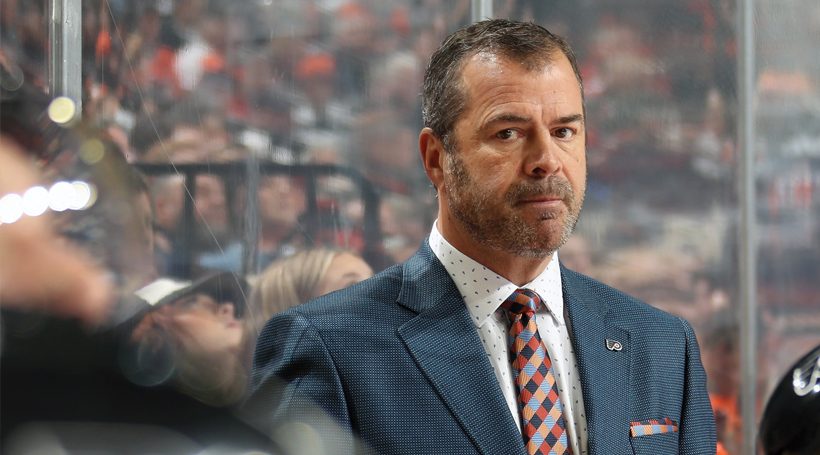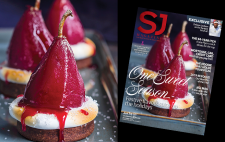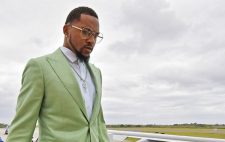The last time the Philadelphia Flyers partied along Broad Street, the Vietnam War was finally ending, “Saturday Night Live” was gearing up for its not-ready-for-prime-time debut and long lines for gas were the new normal.
Between May 1975 – when the Flyers won their second consecutive championship – and this past April, a whopping 17 head coaches have tried unsuccessfully to return Lord Stanley’s Cup to what the orange-and-black faithful believe is its rightful home. Now it’s Head Coach Alain Vigneault’s turn to try to pull the sword from that particular stone.
Vigneault (pronounced vihn-YO), a 58-year-old native of Quebec, came to the Flyers with extensive credentials. His previous 16 years as a head coach in the NHL has included stints with the Montreal Canadiens, Vancouver Canucks and New York Rangers. His record going into this season was 648-435-35.
While in Vancouver during the 2006-07 season, his transforming of the lowly Canucks into a playoff team earned him the Jack Adams Award as NHL Coach of the Year, and the first of two consecutive President’s Awards, presented to the coach whose team accumulated the most regular-season points (he also scored one with the Rangers). He remains the Canucks’ winningest coach.
Nonetheless, like several generations of Flyers fans, he’s still waiting for his first Stanley Cup championship.
Q: You were out of the NHL when the Flyers came calling. Why did you choose to come here, given the pressure to win the Stanley Cup?
When Chuck [Fletcher, the Flyers’ general manager] called me and we started talking, I did a little bit of homework on the team. I felt it had a real good combination of young talent and good veteran players with a lot to prove. That, combined with the fact that Chuck expressed deeply to me that he was in this to win, made me want to come here.
I’ve been very lucky in my coaching career. I’ve always worked for first-class organizations, from Montreal to Vancouver to New York, where we were proactively looking for whatever we could find to help the team. Money was not an object. In talking with Chuck and the ownership here, I felt the same way I did about those other three places. When I put all that together, I wanted one more chance to win a Stanley Cup. I thought this would be a good place to try.
Q: Did anyone warn you against coming to Philly, given its tough reputation?
No. I look at the media here to be knowledgeable, and the fan base is intense. I wouldn’t want it any other way. I’ve coached in two Canadian cities – in Canada, hockey is the sport – and I have coached in New York. So this is like coming home. This is a place where fans want to win, and the media want answers to their questions. You’re supposed to care about your team the way these fans do. People who follow the Flyers, whether it be here in Philly or when we go on the road, are extremely passionate. I wouldn’t want it any other way.
Q: What should Flyers fans know about you off the ice?
I’m a pretty simple guy. I’ve been very fortunate. I have two beautiful daughters, 30 and 26. I’ve got almost the exact same friends I had when I was a teenager. I go back home every summer to spend time with my mum and dad, who are still alive. They’re 85 and 86.
Q: After playing in the NHL for two seasons, you became a coach in Quebec when you were just 25. How did that happen?
I quickly figured out I wasn’t very good as a player, I wasn’t very talented. After my contract with the St. Louis Blues expired, they offered me another deal, but I turned it down. I got married, and I went back to school.
I went to university and met a gentleman working there whose son was playing tier-two junior hockey. He told me nobody wanted to coach the team.
I said, “I’ve got to focus on school, but here’s what I’ll do: Because hockey was so good for me, and because volunteers helped me make it from minor hockey to the NHL, I’ll help you out for two weeks so you can find a coach.” It ended up being two years. My first year we won the championship. My second year we went to the finals. The year after that, the junior-major team asked me to be their coach, and I started getting paid.
Q: How has coaching changed since you started?
It’s changed in every aspect. Just like society has evolved with science and technology, so has hockey. I started working in a time when you were taping things from one VHS to the other. Now, everybody’s got a computer and is breaking down games. You’re getting stats beyond stats.
When I started, there was one coach and one part-time assistant. Now I’m the head guy and I’ve got eight or nine guys: assistants, conditioning guys, two video guys. I find hockey has become a little like football. We’re getting to the analytical stuff. We were maybe a little bit behind, but we’re catching up.
Q: How do you think you’ve changed as a coach?
As a coach, you learn every year. You learn from the people you work with. You learn from the books you read and from different relationships. You’ve got to keep evolving. That’s just the way life is.














